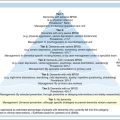Chapter 15 PHYSICAL HEALTH ASSESSMENT
INTRODUCTION
As general medical conditions increase sharply in prevalence with advancing age, many people referred to older persons’ mental health services (OPMHS), and many of their carers, will have one or more such conditions. Common conditions in later life include gastro-oesophageal reflux disorder, hypertension, ischaemic heart disease, type 2 diabetes mellitus, stroke, cancer, osteoarthritis, osteoporosis, chronic obstructive lung disease, impaired vision due to cataracts or macular degeneration, and impaired hearing (presbyacusis). Mental health problems can interact with physical health problems in various ways to increase the person’s level of disability. For instance, some mental health problems, such as dementia or schizophrenia, can lead to reduced adherence with prescribed medications for general medical problems.
Because of its necessary use of technical medical language, this chapter is likely to be most relevant to clinical nurse specialists and junior medical personnel. It is beyond the scope of this book to go into great detail on physical examination. However, those interested in pursuing the matter further are advised to consult one of a number of excellent books on the subject (e.g. Talley & O’Connor 2005). For a shorter treatment of the subject, consult the brief article on physical examination in psychiatric practice by Garden (2005).
MEDICAL HISTORY
There is a strong interaction between mental and physical health problems in that people with chronic physical health problems are more likely to develop mental health problems, and vice versa. For example, chronic physical ill health is a powerful predictor of both depression and anxiety symptoms in older people. In addition, certain acute medical conditions are commonly associated with depression. These include stroke and acute coronary syndrome. In addition, when older people with mental health problems are treated with psychotropic medication, this medication can lead to physical health problems. An example of this is drug-induced Parkinsonism, which can present as either falls or incontinence. Falls occur because of impaired gait and ‘incontinence’ because the older person cannot get to the toilet in time.
EQUIPMENT NEEDED FOR THE PHYSICAL EXAMINATION
Basic equipment needed for a physical examination includes:
Additional equipment may include:
FACTORS TO BE CONSIDERED IN THE PHYSICAL EXAMINATION
Safety
The mental health worker should be alert to factors that might compromise their own safety and that of the older person, particularly when undertaking physical examinations on domiciliary visits with unfamiliar patients. Sometimes, discretion is the better part of valour and the physical examination should be put off until another day. See also Chapter 18.
Evidence of elder abuse
The physical examination provides an opportunity to observe signs of physical abuse or neglect, which may be present if the older person has been the victim of domestic violence or some other type of physical abuse or neglect. Bruises of differing ages are a pointer to elder abuse just as they are to child abuse. Neglect may lead to chronic undernutrition with weight loss and vitamin deficiencies.
Evidence of substance use
Some older people abuse alcohol over a long period and develop the normal sequelae of this. Some older people use illicit drugs, including amphetamines and cannabis. See also Chapter 24.
Level of consciousness
Assess whether the older person is fully conscious and alert or whether they exhibit a reduced level of consciousness. Reduced consciousness starts with clouding of consciousness (reduced awareness) and ends with coma and death. If the level of consciousness appears reduced, the Glasgow Coma Scale (GCS) (Teasdale & Jennett 1974) can be used to document the extent of conscious impairment. Reduced level of consciousness is often a medical emergency, requiring immediate action by the mental health worker.
General appearance
Speech and language
Engage the older person in conversation and note any abnormalities of speech or language. Common abnormalities include dysarthria (slurred speech, which is often due to stroke or intoxication) and dysphasia (reduced ability to generate speech or understand speech, which may be expressive or receptive dysphasia, and is often due to stroke or dementia). A less common problem is dysprosody (loss of the musical quality or rhythm of speech, which is often due to stroke, head injury or Parkinson’s disease). Dysprosody sometimes gives the clinician the impression that the person is speaking with a foreign accent. Other types of speech and language disorders are associated with longstanding mental illness, including the formal thought disorder associated with early-onset schizophrenia (see Ch 13).
Neurological examination
The twelve cranial nerves can be screened quite simply and efficiently, as follows:
| I | Ask the person about their sense of smell. |
| II | Test the person’s eyesight with a Snellen chart. |
| III, IV and VI | Test the person’s eye movements. |
| V | Test facial sensation by soft touch. |
| VII | Ask the person to smile and close their eyes tightly. |
| VIII | Test hearing and balance (ask them to heel–toe walk or stand on one leg). |
| IX and X | Ask the person to speak, to swallow, to say ‘Ah’ (look at their soft palate) and test their gag reflex with a tongue depressor. |
| XI | Ask the person to shrug their shoulders and turn their head. |
| XII | Ask the person to poke out their tongue. |
The pyramidal tract can be screened by testing:
Stay updated, free articles. Join our Telegram channel

Full access? Get Clinical Tree





